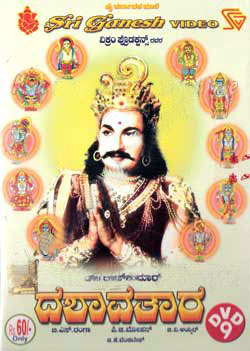Top Qs
Timeline
Chat
Perspective
Dashavathara (film)
1960 Indian film From Wikipedia, the free encyclopedia
Remove ads
Dashavathara (ⓘ transl. The Ten Avatars) is a 1960 Indian Kannada-language film, directed by P. G. Mohan and produced by B. S. Ranga. The film stars Rajkumar, Udaykumar, Rajashankar and Narasimharaju. The film has a musical score by G. K. Venkatesh.[1] This film' sclimax scene was shot in Eastmancolor.
Remove ads
Cast
- Udaykumar as Kamsa
- Rajkumar as Jaya/Hiranyakashipu/Ravana/Shishupala
- Rajashankar as Vishnu and his avataras
- Narasimharaju as Rahu/Makaranda
- K. S. Ashwath
- H. R. Shastry as Dharmaraya
- Eshwarappa
- Veerabhadrappa
- H. K. Shastry
- A. V. Subba Rao
- M. Bhagavathar
- Srikanth
- Kashinath
- Varadaraj
- Kuppuraj
- Rathnakar
- Rajendrakrishna
- Ganapathi Bhat
- Keshavamurthy
- R. Srinivasan
- Girimaji
- Leelavathi as Mandodari/Droupadi
- Advani Lakshmi Devi as Seethe/Rukmini
- Rajasree
- M. Jayashree
- Saroja
- B. Jaya
- Papamma as Shabari
- Baby Suma
- Lakshmikantham
- Mala
Remove ads
Production
The song "Godavaridevi Maunavaagi" is more popularly known as "Vaidehi Enadalo" since the opening words never repeat again in the song. BS Ranga, who planned to shoot a summary of Ramayana via a separate song with actress Jamuna as Seetha, had asked music director GK Venkatesh to check about the availability of actress Jamuna and to verify the status, he sent a telegram using minimal words - Vaidehi Enadalo (meaning what happened to Seetha). Impressed by the phrase, Venkatesh decided to incorporate it into the song’s lyrics.[2]
Remove ads
Soundtrack
The music was composed by G. K. Venkatesh.[3] The song "Vaidehi Enadalo" - which is in kandapadya style, is a rare instance in Indian cinema where a song is picturized on the character of Lord Rama singing for other character. Typically songs are picturized with other characters singing in praise of Rama.[2]
References
External links
Wikiwand - on
Seamless Wikipedia browsing. On steroids.
Remove ads

